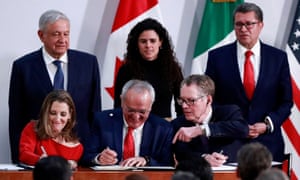
MEXICO CITY/WASHINGTON, Dec 11 (NNN-AGENCIES) – Top officials from Canada, Mexico and the United States signed a fresh overhaul of their quarter-century-old regional trade pact on Tuesday that aims to improve enforcement of worker rights and hold down prices for biologic drugs by eliminating a patent provision.
The signing ceremony in Mexico City launched what may be the final approval effort for US President Donald Trump’s three-year quest to revamp the 1994 North American Free Trade Agreement, a deal he has blamed for the loss of millions of US manufacturing jobs.
The signing ceremony in Mexico City was attended by Mexico President Andres Manuel Lopez Obrador, Canadian Deputy Prime Minister Chrystia Freeland, US Trade Representative Robert Lighthizer, and US White House adviser Jared Kushner.
The US-Mexico-Canada Agreement (USMCA) was signed more than a year ago to replace NAFTA, but Democrats controlling the US House of Representatives insisted on major changes to labor and environmental enforcement before bringing it to a vote.
Intense negotiations over the past week among Democrats, the Trump administration and Mexico produced more stringent rules on labor rights aimed at reducing its low-wage advantage, including verification of labor compliance at the factory level by independent labor experts.
“It is infinitely better than what was initially proposed by the administration,” House Speaker Nancy Pelosi told a news conference, adding that USMCA was now ready for a House vote.
Republican and Democratic U.S. lawmakers say there is broad support for revising the trade pact, which encompasses US$1.2 trillion in annual trade across the continent and supports 12 million US jobs and a third of American agricultural exports, backers say.
Trump launched a renegotiation of NAFTA in his first year in office, intent on delivering on his 2016 campaign promise to replace what he has derided as the “worst deal ever.” Canadian and Mexican leaders reluctantly agreed to join the negotiations with their largest trading partner.
“America’s great USMCA Trade Bill is looking good. It will be the best and most important trade deal ever made by the USA. Good for everybody – Farmers, Manufacturers, Energy, Unions – tremendous support,” Trump tweeted on Tuesday. “Importantly, we will finally end our Country’s worst Trade Deal, NAFTA!”
For Democrats, the deal serves as a retort to Trump’s and Republicans’ assertions that their only agenda was pursuing his impeachment. Also on Tuesday, Democrats in the House of Representatives announced formal charges against Trump that accuse him of abusing power and obstructing Congress, making him only the fourth US president in history to face impeachment.
Agreement on a final USMCA text follows more than a year of delays, led primarily by Democrats and US organized labor, that at times threatened to scuttle a deal originally struck in the fall of 2018.
In addition to the labor provisions, Democrats said they won elimination of a 10-year data exclusivity period for biologic drugs from the agreement, which they feared would lead to higher US drug prices.
But Pelosi said she lost her bid to remove liability protections for internet service providers, a provision she had called a “giveaway” to big tech companies.
US Trade Representative Robert Lighthizer included a last-minute demand of Mexico for a tighter definition of steel and aluminum in USMCA’s automotive rules of origin to be “melted and poured” in North America. While USMCA originally required 70 per cent of the metals used in North American vehicle production come from the region, it did not specify production methods, opening the door to the use of semi-finished metals from China and elsewhere.
Mexico and Canada agreed to a 7-year phase-in of the new standard for steel, industry sources familiar with the deal said. The aluminum demand was dropped, but with the caveat that it would be reconsidered in 10 years.
“On our end, there is now a deal. We’re convinced that it’s a good deal for Mexico, just as it is for Canada and United States,” Lopez Obrador said, adding that the signing would happen in Mexico’s historic National Palace. He expects Mexican lawmakers to back the deal. — NNN-AGENCIES





